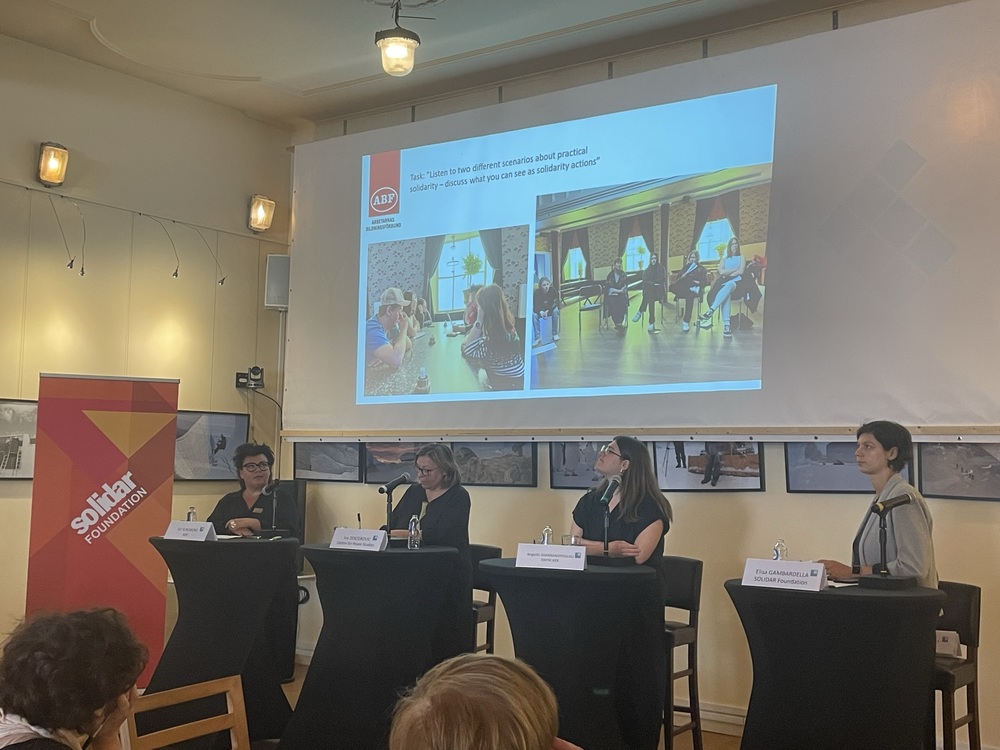ValUE – Solidarity Matters: Celebrating a Solidary European Citizenship

On July 12, SOLIDAR Foundation co-organized with Volonteurope, the concluding event of the ValUE – Solidarity Matters in a Leading Europe in a hybrid format in Brussels. Carried out by a consortium comprising 11 partners and coordinated by SOLIDAR Foundation, the ValUE project which was co-funded by the Europe for Citizens Programme, provided the participants involved with a deeper understanding of the role of solidarity for societal well-being. Through the 9 Solidarity Labs (Action Trainings) organized in Greece, Romania, France, Italy, Croatia, Estonia, Spain, Sweden and Belgium, the project fostered civic and democratic engagement at the European level and the debate on the future of Europe.
As the project has so far engaged more than 500 direct participants with different backgrounds and age groups, SOLIDAR Foundation’s Education and Lifelong Learning Coordinator Elisa Gambardella praised the project’s great results. Not only its pace and timeline was successful, but its results directly fed into the debate on the Conference on the Future of Europe (CoFoE). She also highlighted the SoliDictionary, delivered by the Solidarity Labs and representing a collection of diverse definitions of the concept of solidarity. “It is a meaningful tool that reflects the understanding of solidarity across European countries and divergent communities, exemplifying the European motto: united in diversity”, remarked Elisa. This dynamic tool and the work of the Solidarity Labs resulted in a dynamic Web-Documentary which aims to raise awareness and engage more European residents in the debate on the EU on a long-term basis and serves as a tool for any organization/individual that wants to learn about NFIL methodologies for citizens engagement.
The project proved that the citizenry that is interested in getting involved in the debate on the future of the EU is way wider and more diverse than what is commonly assumed and that reaching out to citizens with different backgrounds, and outside capitals requires specific expertise, which cannot be improvised by institutions. This calls for further cooperation with CSOs for the implementation of policies aimed at social inclusion and for fostering democratic participation in the EU and neighboring countries. Further, the project demonstrated that there is a widespread understanding that the EU’s future can only be sustainable and democratically supported by citizens if it is discussed at the local level. Another important takeaway is that the project’s definitions of solidarity also demonstrated that not only a European citizenship that is tightly linked to social rights would be welcomed and supported, but also that transnational solidarity is understood in its local dimension.
“Have we not learnt the lesson that solidarity is key to human behavior to cope with existential problems?”, keynote speaker, Maria Joao Rodrigues, FEPS President, started her intervention. Especially given the current challenges the EU is facing, she recalled that solidarity should be the key basis for the EU to cope with such existential problems. She remarked that the European Pillar of Social Rights has brought a new commitment to making social rights possible for all European citizens. However, these commitments are confounded by a lack of financial means and a need to transform governments and stressed that civil society organizations that are at the forefront of these issues should have a stronger platform. She also emphasized that organized civil society should be supported on a high level and that a stronger call for participatory citizenship in the EU’s political system is needed on all levels.
The conference was a perfect occasion for a selection of project participants to share the results of their Solidarity Labs. Angeliki Giannakopoulou from DAFNI KEK (Greece), presented the installments of their Solidarity Lab with the overarching theme of Life Skills for Europe sparking conversation on what is essential in the life of EU citizens and how the work of CSOs can assist in this. “We found that the interest in a matter increases when it is spoken about understandably which proves that it is important to let young people use their own words on important matters”, informed project partner Git Sundberg from ABF (Sweden) whose Labs aimed, among other things, to raise awareness for practical solidarity actions in participants’ local environment. Iva Zenzerovic our member from the Centre for Peace Studies (CPS) (Croatia), explained that their Solidarity Lab was organized in connection with CPS’ flagship educational programme.
Godelieve Dutrieux (EACEA), commended the results of the project and notes that the word ‘citizen’ has taken a central role in every Lab. She called this a success since reaching citizens at the individual level is exactly what the Europe for Citizen’s Programme (2014-2020) and its successor the Citizens, Equality, Rights and Values Programme (CERV, 2021-2027) aimed to do. She also acknowledged the important role of Civil Society Organizations in this frame, and thus underlined the shown willingness of the Commission to provide more opportunities for CSOs for direct engagement of citizens in the debate on European democracy, including its solidarity component.
“The impact of the ValUE project on citizens of all ages and the understanding of solidarity and the key values of the EU is striking”, added Oonagh Aitken, Board Member from Volonteurope. She noted that this is a way for CSOs and partnerships to get close to citizens and communities. She also remarked that one of the major opportunities to increase CSO involvement in EU policy-making is to provide more funding for civil society organizations.
While the ValUE project came to an end, the project results are not static. Click to discover the Web-Documentary and other results of the Solidarity Labs!


